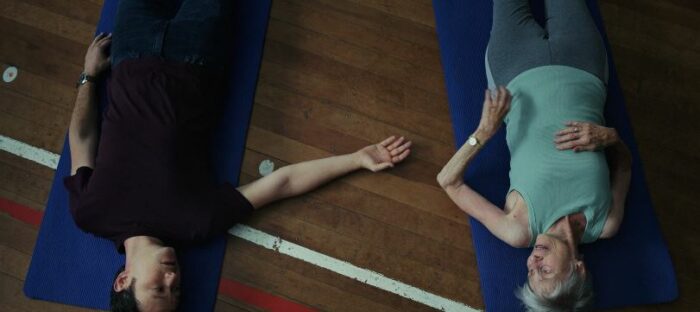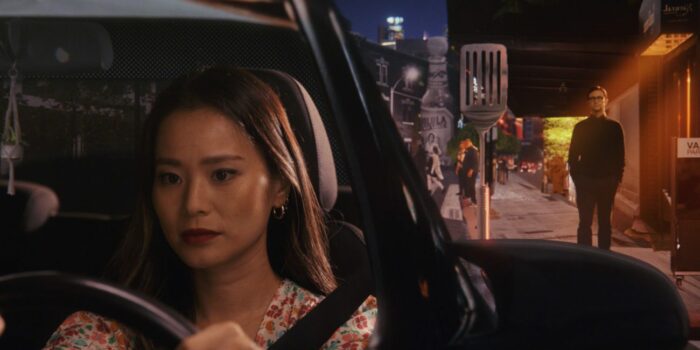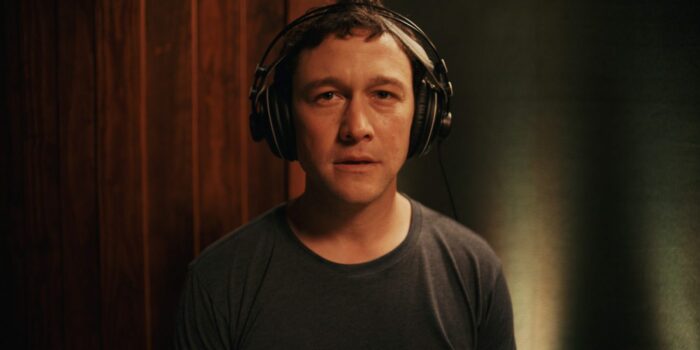The following contains spoilers for the Season 1 finale of Mr. Corman, S1E10, “The Big Picture”
As it comes to a close, I find myself thinking that the thesis statement of Mr. Corman actually was in what Josh said to his mother at the beginning: what matters is this moment we’re living in together right now. Nevermind if it’s terrible. Here we are, alive and breathing. This is what Josh wants to believe. Hell, it’s what I want to believe.
But do we? Can we? Can we take the affirmation the end of “The Big Picture” provides to heart? Perhaps reconcile with the girl woman? Find the happiness in those moments that flash across the screen in the closing montage, some of which are from previous episodes and others of which feel like outtakes…Josh and Victor eat lasagna from the trash. They laugh and smile. Surely this means that everything will be alright.
Josh’s song is called “Now, Here, This” and those words form the bulk of the lyrics.
The drums finally flesh out the song, which Josh has been working on in the opening moments of Mr. Corman episodes throughout the season. He has managed to finish something. And even if he was spurred to it by Emily (Jamie Chung), it is still his accomplishment. It wouldn’t make sense to say he did it for her, particularly since she may well never know. And for a moment, Josh gets to live in that.
This more than anything is what he wants us to hear. This—not an indexical with a referent but the haecceity of this here now in this moment of completion. The phrase “now hear this” (which we can’t help but hear homophonically) may usually presage a complaint or imply something beyond itself, but not in this instance. Or, at least, nothing is given to us to refer “this” to beyond the scene of Josh’s drumming and that accompanying montage. What makes these scenes hang together?
The ending of Mr. Corman is a happy ending to the extent that Josh finally lives in the moment. It’s how he imagines Emily listens to music, unencumbered by too much knowledge and thus not distracted by the past or projecting into the future. Whether this jibes with her actual experience, we also do not know.
And of course these moments have been littered throughout Josh’s life, thus the scenes that form the closing montage of Mr. Corman. I’m not sure they are all happy moments—we see his father in them, after all—but they are perhaps all moments of felt connection. The closing of Episode 2 almost feels missing and exemplary: to reach out a hand to comfort a stranger and simply breathe together.

All of that said, I’m not sure it works and not sure if the problem is with Mr. Corman or with me. I agree with Josh and Emily about how terrible dating is, but the idea of a Zoom date strikes me as worse, or as something I can’t imagine doing because it sounds so crushingly awful. Perhaps many of you out there have had these moments of connection enabled by technology, eaten meals with loved ones on opposite screens, and so on. Maybe many of you have found this kind of connection with another during the pandemic. Someone new. Or reconnected with old friends.
Good for you if you did. Good for Josh and Emily, even if their connection was built more on a desire for connection than anything. But I’m afraid here in the last instance I can’t relate to Josh Corman. “The Big Picture” feels aspirational to me, I suppose, but like one of those delusional stories Emily calls out.
It’s a story about people finding one another and bonding in a time of hardship and isolation. But some of us have just been terribly alone and somehow unable to make connections or maintain existing relationships properly because it feels like the world is ending, or has ended. Why would we want to talk about it, but how could we talk about anything else? Better to not talk at all.
And of course Emily’s comments about white male privilege made me worry about my own privilege as a white man, and if this apocalyptic feeling somehow stems from that. Maybe she’s right and it does. It doesn’t change the truth of the personal experience or make it any easier to feel anything like hope.

Josh may wreck things with Emily during their final Zoom call of S1E10, but she wrecks things, too, and she knows it. What they have found suddenly in facing the actuality of the present reality of the world itself is that they are worlds apart in how they view things. And it strikes me that these differences are irreconcilable.
And I think at some level Josh knows that. He just wants that connection back. That did provide hope, some thought of some possible future, all the better for being limited to Zoom and the phone. But it only goes so far. As much as he wants to see The Big Picture like Emily does, it makes him feel small like Ramon. And as much as he wants to be able to see COVID-19 as something of a blip in the grand scheme of the current state of the world, he can’t.
Perhaps that’s OK.
The finale of Mr. Corman offers catharsis. It’s not about Josh finding a new girlfriend (which would surely make his mother happy) or finally getting over the old one. It’s not about him overcoming his anxiety or becoming well-adapted to the world. It’s not about him coming to terms with his father. The meteor is absent, but it’s not gone.

No, the ending of Mr. Corman is about Josh finishing his song, but moreover about finishing something and living in that moment of completion. Just for now. It is actually about him playing drums—real drums in contrast to drum machine beats he could make in his bedroom. The playing of the drums is not a symbol for anything beyond it.
The Big Picture
I don’t know any better than you do whether there will be more episodes of Mr. Corman; whether this is a season finale or a series finale, but I tend to think the latter. This has been the whole story, fragmentary as it is, composed more of character beats than anything else.
Perhaps it is the story of Josh Corman coming to terms with who he is. Not changing, or improving—just finally being present to himself and recognizing his own desire.
If even that minimally “happy” ending strikes me as a bit unearned, that may well say more about me than the series. It’s hard to tell. But Mr. Corman isn’t about me. It is about Mr. Corman (obviously), and I do see value in the way that all it offers is a testament to his experience. Who am I to question that truth?
Now, here, this.


Loved the show, and your analysis of the ending and whole story. It’s not for everyone, but for the existential thinker. I also agree that in the final scenes montage, they missed the one holding hands with the crying stranger at the breathing exercise meeting. That one was the most touching scene of the entire show.
Thanks! Yeah I thought that was a great little moment